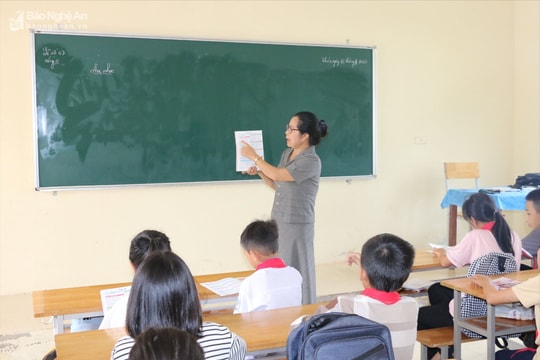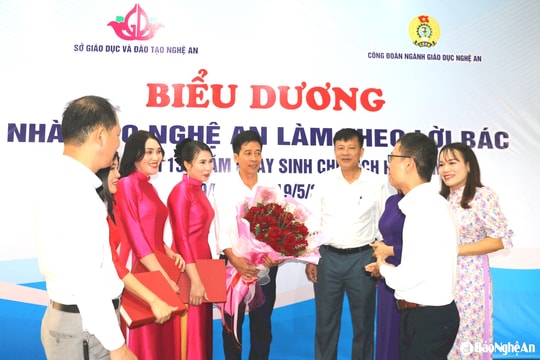Le Quy Don - The brilliant teacher criticized the way of studying for exams
Having passed three exams with the highest score, Le Quy Don criticized the way of studying for exams, and promoted "studying for practice".
Le Quy Don, originally Le Danh Phuong, was born in 1726 into a family of scholars in Dien Ha village, Dien Ha district, Son Nam town, now Doc Lap commune, Hung Ha district, Thai Binh province. He was the eldest son of Doctor Le Phu Thu (later changed to Le Trong Thu) - who once held the position of Minister of Justice. His mother was the daughter of a doctor who had held many official positions.
Since childhood, Le Quy Don was famous for being a studious, intelligent child prodigy with a super memory. People at that time advised each other "Thien ha vo tri van Bang Don", meaning if the world did not know anything, they should ask Le Quy Don. They often called him "the wisdom of the era", a great scholar of Vietnam during the feudal period.
Top three exams
In 1739, Le Quy Don followed his father to study in the capital Thang Long. At the age of 17, under King Le Hien Tong, he took the Huong exam and passed with the highest score (Giai Nguyen). BookTeachers in Vietnamese historyLe Quy Don's exam papers were all given "excellent" marks in four exams, and were highly praised by the examiners. On the day the names were announced, the first sentence from the soldier came out of the long loudspeaker, resounding clearly: "Bachelor - First Prize Winner - Son Nam - Le Quy Don - 18 years old".
Although he was the top scorer in the provincial exam, Le Quy Don failed the national exam several times. He stayed home to teach and write books. It was not until 1752, when he was 27 years old, that Le Quy Don took the national exam again and this time he passed the national exam as the top scorer. In the royal exam, he also passed the Bang Nhan exam. This is the title given to the second in the three best, below the Trang Nguyen exam and above the Tham Hoa exam. However, this exam did not result in the Trang Nguyen exam, so he was the top scorer for the third time.
|
Painting of Le Quy Don. Photo:National Museum of History |
Immediately after passing the exam, Le Quy Don was appointed as an official and held many important positions in the Le Trinh dynasty such as Thi Thu, Thi Giang at the Academy, Toan Tu Quoc Su, Thua Chi at the Academy, Academician at the Secretariat, Tu Nghiep Quoc Tu Giam or Boi Tung. According toComplete Annals of VietnamIn 1783, he was appointed Minister of Public Works.
As a mandarin of the court, Le Quy Don traveled a lot, saw a lot, heard a lot, thanks to which he understood everything thoroughly. He was once sent to the Qing Dynasty and then met the Korean envoy and made them respect and praise him.
"Wisdom of the times"
Le Quy Don is famous as the author of many research works on Vietnamese history, geography, and culture. Regarding history and geography, he has worksDai Viet Thong Su(other name isHistory of the Le Dynasty) with 30 volumes recording more than 100 years of the Le Dynasty, starting from Le Thai To to Le Cung Hoang.
Some other famous books of Le Quy Don can be mentioned as:Miscellaneous Notes on Border Defense(6 volumes) records the social situation of Dang Trong from the 18th century onwards; Van dai loai ngu (9 volumes) - the most massive "encyclopedia" of the feudal period with a lot of knowledge about philosophy, science, literature arranged in order: cosmology, geography, rules, regime, literature, language, writing, natural products, society...
In addition, he has many books on sutras, stories, research books on ancient books, and books of poetry and literature. In the preface of the bookSmall knowledge(Scribbling down things he heard), Le Quy Don admitted that during his time on official duty, traveling far and wide, he "paid attention to research wherever he went, and took notes on everything he saw and heard, adding brief comments and giving them to a page boy to put in his bag".
"Jobuse pen to take notes,add brief commentbut he said that was just a humble way of speaking of a Confucian scholar, no page boy, no book bag could contain what he wrote. Because it was a huge collection of books, up to 40 sets, including hundreds of volumes, covering the fields of philosophy, law, history, geography, agriculture, sociology, ethnology, astronomy, lexicography...", the author of the bookTeachers in Vietnamese historywrite.
The brilliant teacher criticized the way of studying for exams.
Not only a scholar, Le Quy Don was also an excellent teacher among teachers in our country in the 18th century. According toTeachers in Vietnamese history, he once opened a school, many of his students passed the exams. During his time working in education-related jobs in the court, he was always a prestigious teacher, participating in teaching and commenting on literature for the students. He organized the Hoi and Dinh exams, taking care of training and recruiting talents for the country.
Unlike many contemporary masters, Le Quy Don was also a textbook compiler and educational theorist. He saw the limitations of the method of education based on recitation of chapters and verses, serving examinations with the purpose of making people become mandarins, training people lacking in character.
InSmall knowledge, he wrote: "That learning makes clear discussions disappear, the habit of asking for favors becomes more and more popular. People in positions of authority rarely maintain integrity and humility, and in the court they do not hear advice. When faced with a problem, they are timid and careless, when faced with danger, they sell out the country to save themselves, even those who are called famous scholars, are all at ease accepting unjust favors and honors."
Also in this work, he shared that he realized the uselessness and frivolity of spending time polishing and polishing each sentence and each word of poems and prose to praise each other. In the workCloud Platform LanguageHe criticized the Confucian scholars of the time, who only knew how to cram abstract classics and looked down on, or even knew nothing about, other subjects; at the same time, he earnestly proposed to change: "Textbooks must teach all six arts, including literature and weapons."
Regarding the learning motto, Le Quy Don advocated that when studying, one must grasp the main points, have a reasoning mind, not be dependent on books, and study to practice.Translation of Buddhist scriptures, he wrote "Books are endless, words are endless... One must understand the hidden meaning of the sage beyond the words of the book", "reading a book one foot is not equal to practicing an inch".
To parents, Le Quy Don advised "Teach your children to have a career" (not necessarily taking exams as the only way to make a living), "If you want your children to become good people, you must teach them to be afraid, to be ashamed, and to know hardship".
In the context of the chaotic political situation and the country, Le Quy Don fell seriously ill. He then asked to return to his mother's hometown in Duy Tien district, Ha Nam for treatment but did not survive. He died in mid-1784, at the age of 58.
Author Van Tan wrote in the bookVietnamese intellectuals past and present:"Le Quy Don was the greatest scholar of feudal Vietnam. Throughout his life, he tirelessly read books and tirelessly wrote books." Today, Le Quy Don's name is given to many streets and schools from universities to kindergartens throughout the provinces and cities.









